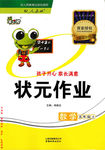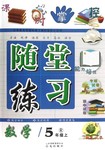题目内容
7.He's posted the letter,_________ he?( )| A. | isn't | B. | doesn't | C. | hasn't | D. | wasn't |
分析 他已经把信寄掉了,对吗?
解答 答案是C.本题考查省略句的反义问句.反义问句的基本结构是"陈述句+简略疑问句?",陈述句用肯定,则疑问句用否定;陈述句用否定,疑问句用肯定;疑问句中的主语和助动词与陈述句一致;题干中"He's posted"完整的表达是"He has posted",故问句中的主语和助动词与"He has"一致,所以答案选择C.
点评 反义问句的解题,首先理解反义问句的作用--证实上文的内容;其次理解反义问句的基本结构;并且积累常见的特殊结构,最后结合语境判断.

练习册系列答案
 优百分课时互动系列答案
优百分课时互动系列答案 开心蛙状元作业系列答案
开心蛙状元作业系列答案 课时掌控随堂练习系列答案
课时掌控随堂练习系列答案
相关题目
2.________ to the current education system of China,the Ministry of Education should make some changes to make it more efficient for selecting talents.( )
| A. | Most of us are so accustomed | B. | So are most of us accustomed | ||
| C. | Accustomed as most of us are | D. | As most of us are accustomed |
19.There is an old story about an army of frogs that went jumping through the forest one day when two of them suddenly fell into a deep (36)A.All of the other frogs gathered around to look.
(37)B at their two fallen friends.They all began to (38)C shake their heads and croak out warnings."It's too deep!"croaked one frog.Another croaked that there was no (39)D they would ever be able to get out (40)B.
The two fallen frogs began to continuously jump as they (41)A to get out,but the frogs that were (42)C kept croaking louder at them that they might as well stop (43)B they were as good as dead and just (44)D their time.One of the two frogs finally gave up,(45)C their advice and died.
The other frog just kept on jumping harder than ever (46)A all the loud croaks of disapproval from the frogs around the top of the hole.They kept croaking at him to (47)D jumping and save himself from all the (48)B and suffering as he jumped and fell back down to the bottom (49)C.
Finally,to the (50)D of all the other frogs,he jumped right out of the deep hole.The other frogs asked him,"Why did you keep jumping (51)A we yelled and croaked at you to stop?"The frog explained to them he was (52)B at that time and that he had thought they were cheering for him and yelling words of (53)D to him the entire time!
A little encouragement can go a long way.We don't often think about the(54)C that our words have upon others.Our words do have the power to hurt or to(55)A.
(37)B at their two fallen friends.They all began to (38)C shake their heads and croak out warnings."It's too deep!"croaked one frog.Another croaked that there was no (39)D they would ever be able to get out (40)B.
The two fallen frogs began to continuously jump as they (41)A to get out,but the frogs that were (42)C kept croaking louder at them that they might as well stop (43)B they were as good as dead and just (44)D their time.One of the two frogs finally gave up,(45)C their advice and died.
The other frog just kept on jumping harder than ever (46)A all the loud croaks of disapproval from the frogs around the top of the hole.They kept croaking at him to (47)D jumping and save himself from all the (48)B and suffering as he jumped and fell back down to the bottom (49)C.
Finally,to the (50)D of all the other frogs,he jumped right out of the deep hole.The other frogs asked him,"Why did you keep jumping (51)A we yelled and croaked at you to stop?"The frog explained to them he was (52)B at that time and that he had thought they were cheering for him and yelling words of (53)D to him the entire time!
A little encouragement can go a long way.We don't often think about the(54)C that our words have upon others.Our words do have the power to hurt or to(55)A.
| 36.A.hole | B.river | C.well | D.valley |
| 37.A.up | B.down | C.over | D.around |
| 38.A.violently | B.gently | C.sadly | D.doubtfully |
| 39.A.wonder | B.doubt | C.Problem | D.way |
| 40.A.alone | B.alive | C.aware | D.awake |
| 41.A.attempted | B.chose | C.preferred | D.failed |
| 42.A.helping | B.jumping | C.watching | D.cheering |
| 43.A.if | B.because | C.though | D.until |
| 44.A.saving | B.spending | C.killing | D.wasting |
| 45.A.ignored | B.offered | C.followed | D.rejected |
| 46.A.in spite of | B.as a result of | C.in terms of | D.instead of |
| 47.A.try | B.practise | C.imagine | D.quit |
| 48.A.stress | B.pain | C.panic | D.trouble |
| 49.A.here and there | B.now and then | C.over and over | D.neck and neck |
| 50.A.delight | B.disappointment | C.embarrassment | D.surprise |
| 51.A.even though | B.now that | C.as though | D.in case |
| 52.A.blind | B.deaf | C.numb | D.clumsy |
| 53.A.warning | B.trust | C.wisdom | D.encouragement |
| 54.A.pressure | B.magic | C.effect | D.force |
| 55.A.help | B.protect | C.prevent | D.create |
16.Today I am known for my voice.Perhaps the greatest honor came when I was asked to read The New Testament (《新约全书》) on tape.
But it (36)B a long time to believe such good things could happen to me.When I was a child,I stuttered (结巴) so badly that I was completely (37)C to speak in public.
Then when I was 14,Professor Donald Crouch came to my school.He was a retired college professor.English was his favorite subject and (38)Dwas his deepest love.He held a book of poems as if it were a crystal,turning pages as if uncovering treasures.When he heard that our school was teaching Shakespeare and other classics,he felt regretful for not being a part of our school sooner.
When he learned that I not only loved poetry but was writing it,we became closer.There was,however,one(39)A-Professor Crouch could not stand the fact that I refused to read my poems to the class.
"Jim,poetry is (40)Bto be read aloud,"he said."You should be able to speak those beautiful words."I shook my head and(41)A.
One day he(42)Cme.
After handing in a poem,I waited for his (43)D.It didn't come.Instead one day as the students had gathered together,he (44)Ame,"Jim,I don't think you wrote this poem."
I stared at him in disbelief."Why,"I started,(45)Bflooding me."of course I did!""Well,then,"he said,"you've got to prove it by getting up and (46)C it from memory."
By then the other students had settled at their desks.With knees shaking,I walked up to the front.For a moment I stood there,breathless.Then I began,and kept going.I recited my poem all the way through!
Afterwards,Professor Crouch encouraged me to read other writers'poetry before the public. I discovered I did have a (n)(47)Aand found my classmates actually looked forward to hearing me recite.
But it (36)B a long time to believe such good things could happen to me.When I was a child,I stuttered (结巴) so badly that I was completely (37)C to speak in public.
Then when I was 14,Professor Donald Crouch came to my school.He was a retired college professor.English was his favorite subject and (38)Dwas his deepest love.He held a book of poems as if it were a crystal,turning pages as if uncovering treasures.When he heard that our school was teaching Shakespeare and other classics,he felt regretful for not being a part of our school sooner.
When he learned that I not only loved poetry but was writing it,we became closer.There was,however,one(39)A-Professor Crouch could not stand the fact that I refused to read my poems to the class.
"Jim,poetry is (40)Bto be read aloud,"he said."You should be able to speak those beautiful words."I shook my head and(41)A.
One day he(42)Cme.
After handing in a poem,I waited for his (43)D.It didn't come.Instead one day as the students had gathered together,he (44)Ame,"Jim,I don't think you wrote this poem."
I stared at him in disbelief."Why,"I started,(45)Bflooding me."of course I did!""Well,then,"he said,"you've got to prove it by getting up and (46)C it from memory."
By then the other students had settled at their desks.With knees shaking,I walked up to the front.For a moment I stood there,breathless.Then I began,and kept going.I recited my poem all the way through!
Afterwards,Professor Crouch encouraged me to read other writers'poetry before the public. I discovered I did have a (n)(47)Aand found my classmates actually looked forward to hearing me recite.
| 36.A.lasted | B.took | C.cost | D.wasted |
| 37.A.unnecessary | B.unlikely | C.unable | D.impossible |
| 38.A.archaeology | B.art | C.architecture | D.poetry |
| 39.A.difficulty | B.promise | C.agreement | D.difference |
| 40.A.said | B.meant | C.prepared | D.found |
| 41.A.turned away | B.sat down | C.talked back | D.gave in |
| 42.A.greeted | B.scolded | C.tricked | D.comforted |
| 43.A.help | B.idea | C.reward | D.comment |
| 44.A.challenged | B.attacked | C.noticed | D.told |
| 45.A.pride | B.anger | C.excitement | D.joy |
| 46.A.reading | B.speaking | C.repeating | D.telling |
| 47.A.voice | B.Sound | C.appearance | D.interest |